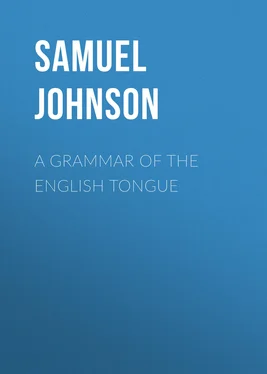Ch , in some French words not yet assimilated, sounds like sh , as machine , chaise .
C , according to English orthography, never ends a word; therefore we write stick , block , which were originally, sticke , blocke . In such words c is now mute.
It is used before l and r , as clock , cross .
D
Is uniform in its sound, as death , diligent .
It is used before r , as draw , dross ; and w as dwell .
F
F , though having a name beginning with a vowel, is numbered by the grammarians among the semivowels, yet has this quality of a mute, that it is commodiously sounded before a liquid, as flask , fry , freckle . It has an unvariable sound, except that of is sometimes spoken nearly as ov .
G
G has two sounds; one hard, as in gay , go , gun ; the other soft, as in gem , giant .
At the end of a word it is always hard, as ring , snug , song , frog .
Before e and i the sound is uncertain.
G before e is soft, as gem , generation , except in gear , geld , geese , get , gewgaw , and derivatives from words ending in g , as singing , stronger , and generally before er at the ends of words, as finger .
G is mute before n , as gnash , sign , foreign .
G before i is hard, as give , except in giant , gigantick , gibbet , gibe , giblets , Giles , gill , gilliflower , gin , ginger , gingle , to which may be added Egypt and gypsy .
Gh in the beginning of a word has the sound of the hard g , as ghostly ; in the middle, and sometimes at the end, it is quite silent, as though , right , sought , spoken tho' , rite , soute .
It has often at the end the sound of f , as laugh ; whence laughter retains the same sound in the middle; cough , trough , sough , tough , enough , slough .
It is not to be doubted, but that in the original pronunciation gh has the force of a consonant deeply guttural, which is still continued among the Scotch.
G is used before h , l , and r .
H
H is a note of aspiration, and shows that the following vowel must be pronounced with a strong emission of breath, as hat , horse .
It seldom begins any but the first syllable, in which it is always sounded with a full breath, except in heir , herb , hostler , honour , humble , honest , humour and their derivatives.
It sometimes begins middle or final syllables in words compounded, as blockhead ; or derived from the Latin, as comprehend .
J
J consonant sounds uniformly like the soft g , and is therefore a letter useless, except in etymology, as ejaculation , jester , jocund , juice .
K
K has the sound of hard c , and is used before e and i , where, according to English analogy, c would be soft, as kept , king , skirt , skeptick , for so it should be written, not sceptick , because sc is sounded like s , as in scene .
It is used before n , as knell , knot , but totally loses its sound in modern pronunciation.
K is never doubled; but c is used before it to shorten the vowel by a double consonant, as cockle , pickle .
L
L has in English the same liquid sound as in other languages.
The custom is to double the l at the end of monosyllables, as kill , will , full . These words were originally written kille , wille , fulle ; and when the e first grew silent, and was afterward omitted, the ll was retained, to give force, according to the analogy of our language, to the foregoing vowel.
L , is sometimes mute, as in calf , half , halves , calves , could , would , should , psalm , talk , salmon , falcon .
The Saxons, who delighted in guttural sounds, sometimes aspirated the l at the beginning of words, as hlaf , a loaf , or bread ; hlaford , a lord ; but this pronunciation is now disused.
Le at the end of words is pronounced like a weak el , in which the e is almost mute, as table , shuttle .
M
M has always the same sound, as murmur , monumental .
N
N has always, the same sound, as noble , manners .
N is sometimes mute after m , as damn , condemn , hymn .
P
P has always the same sound which the Welsh and Germans confound with b .
P is sometimes mute, as in psalm , and between m and t , as tempt .
Ph is used for f in words derived from the Greek, as philosopher , philanthropy , Philip .
Q
Q , as in other languages, is always followed by u , and has a sound which our Saxon ancestors well expressed by cw , as quadrant , queen , equestrian , quilt , inquiry , quire , quotidian . Qu is never followed by u .
Qu is sometimes sounded, in words derived from the French, like k , as conquer , liquor , risque , chequer .
R
R has the same rough snarling sound as in the other tongues.
The Saxons used often to put h before it, as before l at the beginning of words.
Rh is used in words derived from the Greek, as myrrh , myrrhine , catarrhous , rheum , rheumatick , rhyme .
Re , at the end of some words derived from the Latin or French, is pronounced like a weak er , as theatre , sepulchre .
S
S has a hissing sound, as sibilation , sister .
A single s seldom ends any word, except in the third person of verbs, as loves , grows ; and the plurals of nouns, as trees , bushes , distresses ; the pronouns this , his , ours , yours , us ; the adverb thus ; and words derived from Latin, as rebus , surplus ; the close being always either in se , as house , horse , or in ss , as grass , dress , bliss , less , anciently grasse , dresse .
Читать дальше












